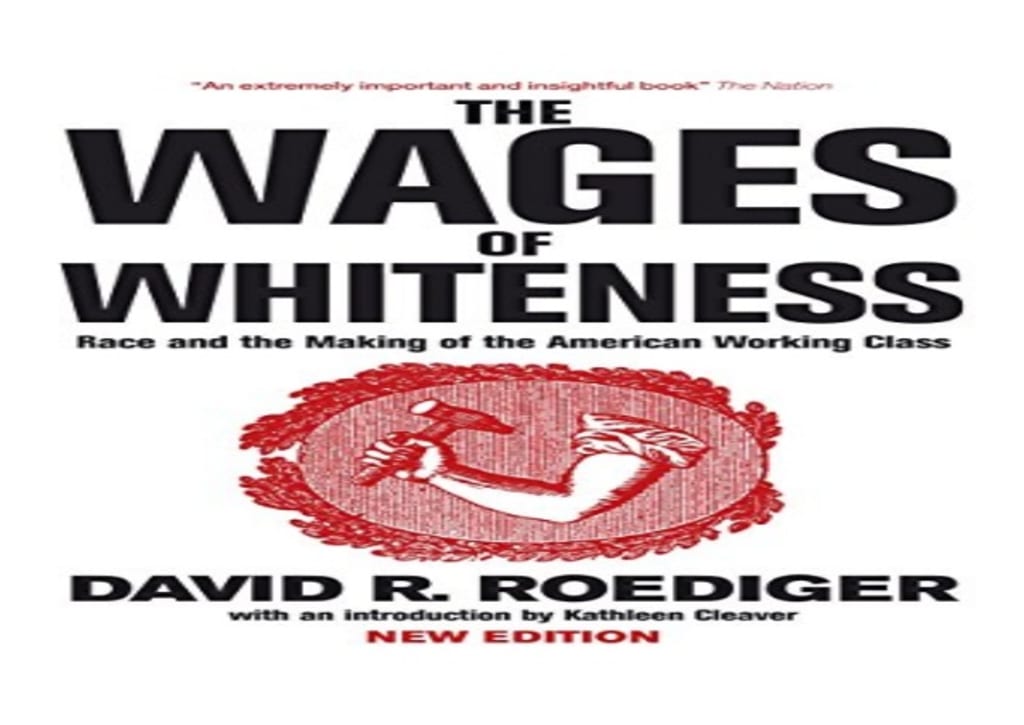Book Review: 'The Wages of Whiteness: Race and the Making of the American Working Class' by David Roediger
Book review of the Wages of Whiteness by David Roediger

In the year 2019, race remains an enigma often explored, but never resolved; its concept so intricate, that to thoroughly unpack almost seems outside the realms of realism. Race and racism are often limited to a perspective which analyzes their effects on their victims while ignoring their impact on their perpetrators. David Roediger’s 1991 The Wages of Whiteness: Race and the Making of the American Working Class inspects the effects of racism on those who executed its ideals during the industrial age in America. Roediger offers a heavily dense, and informative synthesis of the cultural, linguistic and psychological ramifications of 19th century American labor. The Wages of Whiteness brims with various multi-layered arguments-- perhaps, the most distinct asserts that whiteness is a forged identity. White Americans living in the “free North,” Roediger implies, used whiteness as a form of agency. The prevailing motif argues that rather than an innate, default form of being, whiteness was intentionally constructed and purposely employed. The instrumentality and evolution of whiteness depicted through the lens of the industrial North reveals the perplexing nature of race, and racism in antebellum America.
Roediger begins with the revelation that the white identity cannot exist in the absence of other races as it is grounded on the notion of “otherness.” The author briefly traces the roots of “otherness” to Great Britain, but parks at colonial America, in what he calls the “prehistory” of whiteness. The atmosphere of pre-revolution America yielded great emphasis on economic, political and physical freedom. Feelings of “otherness” sprouted through associations with Native Americans, who in contrast to bound African slaves, were “too independent.” Interactions with the Native Americans compared to the enslaved Africans produced an overall feeling of “otherness” amongst all opposing parties. While “otherness” was prevalent, waged labor was not yet a commonplace experience for most whites. Thus, the existences of whites were completely different than those of slaves or Native Americans. The industrial revolution and the rise of waged labor caused lines to blur. Roediger’s objective in discussing the “prehistory” of whiteness is to argue that while whiteness was not yet fully conceived and thus the term “white worker” was not yet synonymous with “worker,” race and racism came into formation in those times.
The Wages of Whiteness seeks to determine how the American worker became “white” as a default state. Language and its psychological impacts serve as a sturdy foundation for Roediger’s narrative. With the hype of the revolution still lingering, the term “freedman” became a badge of honor during post-revolution times. On the other hand the term “slave” was not only the antithesis to freedom, but also conjured images of blackness, which was associated with evil and lowliness. Slave became synonymous with “black.” Slaves were at the very bottom of the totem pole -- even if one was a poor “hireling” or an “indentured servant” whose terms resembled complete bondage, they were above a black slave.
Other terms noted by Roediger is that of “servant” and “master”; the latter phrase evolved into “boss” in order to eliminate traces of slave culture. Roediger also discusses terms such as “working like a slave,” “working like a nigger,” “free white labor,” and “white slaves.” The phrase “white slave” in particular, gained much attention as it was used by labor activists to promote better conditions for white workers--thus, implying that certain conditions (such as chattel slavery) were only suited for those of darker hues. Usage of the term dwindled when those in the South began to argue that even slavery was better than waged labor. Many workers, particularly the Irish worker took much offense to that claim.
A large fraction of American workers in the “minstrel mecca of New York City ”were Irish immigrants who clung to their whiteness in fear of downward mobility. Minstrelsy frequently featured Irish actors but catered to all working class white Americans, as it allowed them to poke fun at class and politics under the guise of blackface. Working class whites were free to act black, feminine, or homosexual, while maintaining their whiteness.
Irish immigrants also faced a good deal of racism. They were often referred to as “Irish niggers” or “Irish slaves.” They were stereotyped as promiscuous and drunken, and typically endured working conditions similar to blacks. So, the Irish clung to white supremacy. Roediger argues that whiteness became the primary instrument of power for the Irish because it allowed them to at the very least reap the benefits of not being black. Since blacks had little economic or political power, it was easier for Irish to join in the fight against blacks then it was to stand with them in a shared oppression. Whiteness provided them an extra compensation that was not included in their low-wage benefits package.
Using antebellum labor history as a vessel, Roediger brings the discussion of race and morality to the forefront. He confronts the moral deterioration that perpetrators of racism endure. In The Wages of Whiteness, Roediger slightly presents the perpetrators of racism as victims who were forced to rely on dehumanizing tactics in order to secure their own American dream. Ultimately, The Wages of Whiteness shows that there are no real winners of white supremacy.






Comments
There are no comments for this story
Be the first to respond and start the conversation.